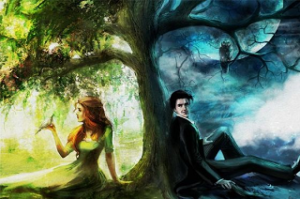
Abandonment in the literature
The subject seems hidden in the literature, but it is not, I began to read  the author’s Abandon trilogy Meg Cabot because there was reference to the myths of Hades and Persephone.
the author’s Abandon trilogy Meg Cabot because there was reference to the myths of Hades and Persephone.
But the climate of excessive suspense, in my view of course, made me uninterested in the book and unlike many others that I return to and understand the author’s purpose, in this I did not do it. For those who do not know the mythology Persephone is Zeus’s daughter with Demeter, was a goddess concerned with picking flowers, and gradually when he grew up he enchanted the god Hades, lord of the dead who asked his daughter to marry him, but Demeter did not want them to get married .
They end up getting married, but Demeter asks Zeus to bring her back at the end of a complicated plot, Persephone ends up with a period with Hades, which is winter on Olympus, and a period with Demeter, which is spring in the realm of Greek gods. Anyway, the trilogy does not seem to me at the beginning any of this, it was just a “cult” touch.
Another more realistic book caught my attention, I find the Italian author Elena Ferrante, who has been writing since January in The Guardian, about family, childhood, gender and aging.
While I was waiting for a friend in a bookstore in Lisbon, I began to leaf through the book “Days of Abandonment” by Elena Ferrante, which tells the story (I do not know if it is true) of Olga, who is abandoned by Mario and finds herself trapped in a shattered daily life with two children, a dog and no job, but will fight against the feeling of a poor abandoned woman. I did not go to the end, of course, and I did not buy the book to resist the temptation to deviate from my compulsory readings, which at this moment are many and the pile is huge, I quickly saw on the Internet that 90% of the people who read it liked it.
Your book “A genial friend” is going to the TVs, in Portugal there will be a series.









